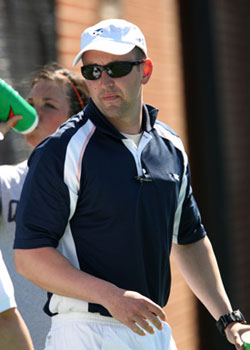Ask the Experts
Talking with Brett Karpman of Queens University
by Julie Wrege, 11 August 2010
| Share: |  |
|  | |
|
|
Coach Brett Karpman returned to his alma mater Queens University of Charlotte in 2007 as the head coach of both the men's and women's tennis teams. He had previously been the assistant coach at the University of North Carolina at Wilmington.
Karpman just completed his 3rd season at Queens, leading both his NCAA Division II programs to winning seasons. His women's program finished 20-2 - with an undefeated 17-0 regular season. They then competed in the NCAAs, losing in the second round to eventual champion and top-seeded Armstrong Atlantic State University.

Queens University Coach Brett Karpman
courtesy, Queens Athletics
Questions and Answers Julie Wrege (JW): What advice do you have for junior players who are considering playing tennis at NCAA Division II programs?Brett Karpman (BK): The same advice I would give someone who wants the division I experience. Become involved in the process early. Look at as many schools and programs as possible, do your home work, and be realistic about your opportunities.
Logistically, have your eligibility center ID number ready - along with some sort of mechanic/match play media and your tennis c.v.
When you get to speak with a coach, ask direct questions with merit that will affect your decision - if you forget to ask something, keep a list and stay in contact.
JW: What qualities do you look for in a potential recruit?
BK: I look for players that have a deep passion for the game and who love to compete. I need players that can be trusted in the lineup to produce - while being able to thrive in the classroom.
Here at Queens, we also look for kids who will be enjoyable to train, travel and compete with.
JW: How does recruiting for Division II program differ from recruiting at DI?
BK: Firstly, everyone should realize that you cannot simply characterize a school or tennis program based on its division alone - there are huge differences among the D-II schools - and you can say the same thing about D-I or D-III. The level of play, budget, size, and location of different schools varies wildly among schools in the same division.
I believe in college tennis there are a lot more similarities than differences between the divisions when it comes to recruiting, but depending on the type of program, many differences can exist.
Division II does allow for a try-out on campus - and as a whole does not offer as many official visits
JW: You have a mix of US and international players on both of your teams. Is it hard to get the right mix?
BK: It is extremely difficult to find the players that fit the team culture, but that is one of the biggest aspects of a college coach's job - and why so much emphasis and effort is spent on recruiting.
Despite the various accents and interesting customs, the players are very close. The cultural differences provide entertainment - and they bring a unique element to the bond that exists between teammates.
JW: Why are so many internationals players competing at the D-II level? BK: I think a lot of high-level international players become tired of the travel and hotel stays that is a constant in tennis. I think a large perk to the Division II experience is the reduced travel and slightly shorter seasons. I also do not think they prioritize Division I in the same manner as Americans juniors.
JW: Your women's team ended up at No. 47 in the NCAA rankings at the end of the year. What will it take to push the men's team at Queens into the NCAA team rankings?
BK: We do not look at the ranking and just focus on the process. If the players are taking care of business on the court and in the gym - and approach competing with the right focus - the results will take care of themselves.
Leave a Comment
More Ask the Experts
11-Feb-2021
Know The Drill: Improving Your Approach and Net Game
No matter the age or experience level, drill work can help players improve their game and enhance their fundamentals. USC men's head coach Brett Masi shares his favorite drill for helping players get more comfortable coming to the net to close out points.
5-Nov-2014
Countdown: Q&A with Alexandria Livingston of Saint Peters
In 2010, Alexandria Livingston was a standout tennis player at
Columbia High School in Maplewood, N.J., who had committed to Saint
Peter's University. Fast forward four years, and Livingston has
completed her college tennis career and graduated from Saint Peter's.
Harry Cicma of NBC Sports recently talked with Livingston about her
college tennis experience.
31-Jul-2014
Conversation with Tech Assistant Coach Derek Schwandt
Georgia Tech Assistant Coach Derek Schwandt has done it all - a
two-time All-Atlantic 10 player in college at Richmond, three years on
the ITF futures and ATP challengers tour, and a top college assistant
coach. Schwandt is also a coach of the USTA Collegiate National Team -
a training program that helps top American college players transition
to professional tennis. Harry Cicma of NBC Sports recently talked
with Schwandt about all things tennis.